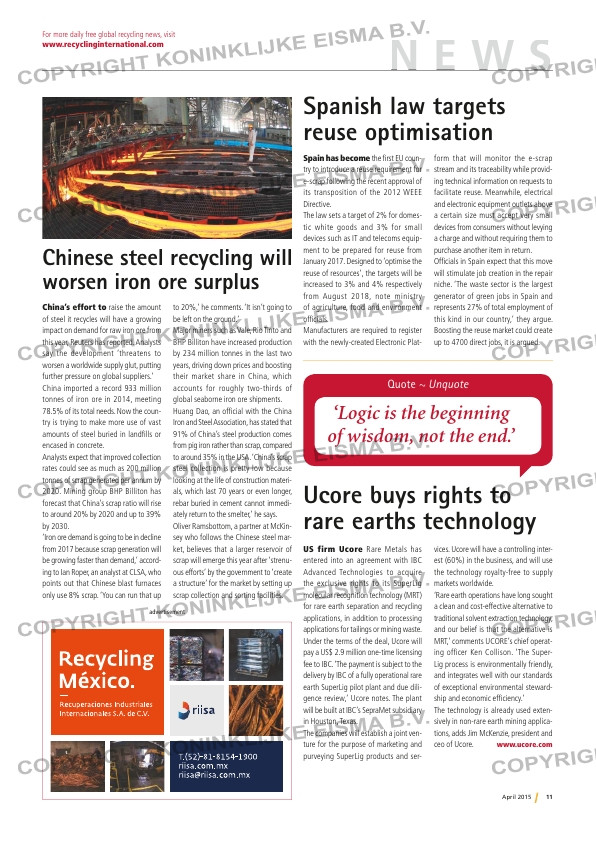Page 11 from: April 2015

N E W S
11April 2015
For more daily free global recycling news, visit
www.recyclinginternational.com
advertisement
Quote ~ Unquote
‘Logic is the beginning
of wisdom, not the end.’
China’s effort to raise the amount
of steel it recycles will have a growing
impact on demand for raw iron ore from
this year, Reuters has reported. Analysts
say the development ‘threatens to
worsen a worldwide supply glut, putting
further pressure on global suppliers.’
China imported a record 933 million
tonnes of iron ore in 2014, meeting
78.5% of its total needs. Now the coun-
try is trying to make more use of vast
amounts of steel buried in landfi lls or
encased in concrete.
Analysts expect that improved collection
rates could see as much as 200 million
tonnes of scrap generated per annum by
2020. Mining group BHP Billiton has
forecast that China’s scrap ratio will rise
to around 20% by 2020 and up to 39%
by 2030.
‘Iron ore demand is going to be in decline
from 2017 because scrap generation will
be growing faster than demand,’ accord-
ing to Ian Roper, an analyst at CLSA, who
points out that Chinese blast furnaces
only use 8% scrap. ‘You can run that up
to 20%,’ he comments. ‘It isn’t going to
be left on the ground.’
Major miners such as Vale, Rio Tinto and
BHP Billiton have increased production
by 234 million tonnes in the last two
years, driving down prices and boosting
their market share in China, which
accounts for roughly two-thirds of
global seaborne iron ore shipments.
Huang Dao, an offi cial with the China
Iron and Steel Association, has stated that
91% of China’s steel production comes
from pig iron rather than scrap, compared
to around 35% in the USA. ‘China’s scrap
steel collection is pretty low because
looking at the life of construction materi-
als, which last 70 years or even longer,
rebar buried in cement cannot immedi-
ately return to the smelter,’ he says.
Oliver Ramsbottom, a partner at McKin-
sey who follows the Chinese steel mar-
ket, believes that a larger reservoir of
scrap will emerge this year after ‘strenu-
ous efforts’ by the government to ‘create
a structure’ for the market by setting up
scrap collection and sorting facilities.
Chinese steel recycling will
worsen iron ore surplus
Spain has become the fi rst EU coun-
try to introduce a reuse requirement for
e-scrap following the recent approval of
its transposition of the 2012 WEEE
Directive.
The law sets a target of 2% for domes-
tic white goods and 3% for small
devices such as IT and telecoms equip-
ment to be prepared for reuse from
January 2017. Designed to ‘optimise the
reuse of resources’, the targets will be
increased to 3% and 4% respectively
from August 2018, note ministry
of agriculture, food and environment
offi cials.
Manufacturers are required to register
with the newly-created Electronic Plat-
form that will monitor the e-scrap
stream and its traceability while provid-
ing technical information on requests to
facilitate reuse. Meanwhile, electrical
and electronic equipment outlets above
a certain size must accept very small
devices from consumers without levying
a charge and without requiring them to
purchase another item in return.
Offi cials in Spain expect that this move
will stimulate job creation in the repair
niche. ‘The waste sector is the largest
generator of green jobs in Spain and
represents 27% of total employment of
this kind in our country,’ they argue.
Boosting the reuse market could create
up to 4700 direct jobs, it is argued.
Spanish law targets
reuse optimisation
US firm Ucore Rare Metals has
entered into an agreement with IBC
Advanced Technologies to acquire
the exclusive rights to its SuperLig
molecular recognition technology (MRT)
for rare earth separation and recycling
applications, in addition to processing
applications for tailings or mining waste.
Under the terms of the deal, Ucore will
pay a US$ 2.9 million one-time licensing
fee to IBC. ‘The payment is subject to the
delivery by IBC of a fully operational rare
earth SuperLig pilot plant and due dili-
gence review,’ Ucore notes. The plant
will be built at IBC’s SepraMet subsidiary
in Houston, Texas.
The companies will establish a joint ven-
ture for the purpose of marketing and
purveying SuperLig products and ser-
vices. Ucore will have a controlling inter-
est (60%) in the business, and will use
the technology royalty-free to supply
markets worldwide.
‘Rare earth operations have long sought
a clean and cost-effective alternative to
traditional solvent extraction technology,
and our belief is that the alternative is
MRT,’ comments UCORE’s chief operat-
ing officer Ken Collison. ‘The Super-
Lig process is environmentally friendly,
and integrates well with our standards
of exceptional environmental steward-
ship and economic effi ciency.’
The technology is already used exten-
sively in non-rare earth mining applica-
tions, adds Jim McKenzie, president and
ceo of Ucore. www.ucore.com
Ucore buys rights to
rare earths technology
RI-3 NEWS.indd 11 30-03-15 10:07



